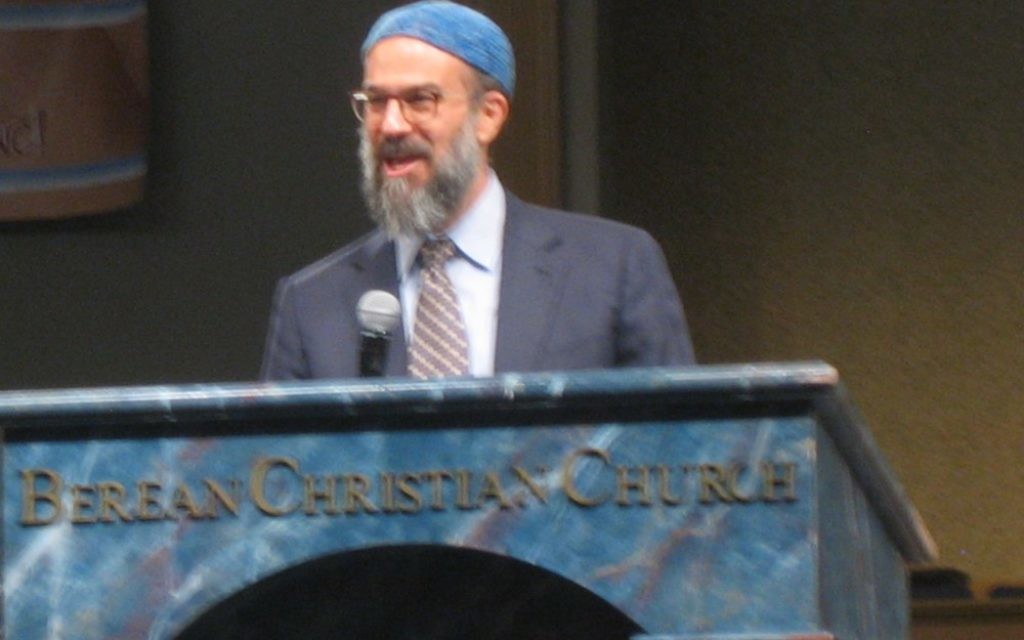Faith Leaders Target Safety With Police Ties

Berean Christian Church in Stone Mountain hosted an emotional meeting Thursday, Aug. 11, attended by law enforcement officials, religious leaders and others who are tired of just going to meetings and want a plan of action to make their communities safer and to forge better relations between police and citizens.
Spearheaded by the Georgia Chapter of the National Organization of Black Law Enforcement Executives, which has 4,000 members from local to federal law enforcement, the meeting’s overarching objective was to provide a plan for police and faith communities to interact more purposefully and with better communication.
Several Georgia-based law enforcement officials are national NOBLE leaders, some of whom addressed the audience.
Get The AJT Newsletter by email and never miss our top stories Free Sign Up

Rabbi Hillel Norry closes the program at Berean Christian Church on Aug. 11.
DeKalb County is Georgia’s first county to implement such an action plan, partially because of a strong willingness among community leaders and partially because it is the most diverse county in the state. DeKalb’s policies will spread to other metro Atlanta counties and ultimately throughout Georgia.
Elder Robert Pierce from New Mercies Christian Church in Lilburn, who is originally from the Bronx, N.Y., said the police shootings of unarmed African-Americans and the retaliatory shootings of police officers have shifted the focus on how the two groups respond and interact.
“We all care about the community and recognize that the majority of police officers are good. They don’t like bad officers either. In fact,” he said, “the majority of complaints about police officers come from other police officers.”
Comparing the local policing model and that in New York, Pierce said: “This is a much better model. NYPD often uses strong-arm tactics, instilling fear. I was personally stopped and frisked for no reason many times, and these polices haven’t changed. The best recourse we have is citizen journalists; before this, it was just our word against” the police.
DeKalb Solicitor General Sherry Boston spoke about the “widening gaps in the community,” a sentiment reiterated in a five-minute video titled “We Are Human, Too.” Local law enforcement officials were interviewed for that video, including DeKalb Chief Deputy Sheriff Reginald Scandrett, who acknowledged that trust in law enforcement has decreased.
Pastor Troy Bush of Rehoboth Baptist Church said, “We are not here for celebration, for there are cracks in our foundation.” He also recognized that while there are bad police officers, “there are also bad systems.”
Cedric Alexander, a former national president of NOBLE and current DeKalb deputy chief operating officer of public safety, was one of 10 officers selected by President Barack Obama to create actionable policies for the National Task Force on 21st Century Policing. Released in May 2015, the report offers nearly 60 recommendations.
Obama used an executive order to put the plan into effect, and several police departments across the nation have adopted the it.
Several law enforcement officers spoke in quick succession about the plan of action, including Robert Ford, the president of the NOBLE Georgia Chapter, and interim DeKalb Police Chief James Conroy. Each focused on certain segments of the plan: increased civic engagement, education, informal and formal relationships, and mandatory cultural diversity training.
Another key element is that officers will receive consistent psychological evaluations to ensure they can fulfill their duties.
Sherry Gaither from Stronghold Christian Church in Lithonia gave a rousing presentation about the need for grassroots, civic engagement. She concluded by paraphrasing Pirke Avot (Ethics of the Fathers): “You are not obligated to complete the work, but neither are you free to desist from it.”
Pastor Marlin Harris from New Life Baptist Church in Decatur emphasized that law enforcement and the community want the same things: “justice, fairness and equity.”
“You (police) want respect and deserve it,” he said, “and we (community members) want respect and deserve it.”
At the end of the stirring program, Rabbi Hillel Norry, the former Congregation Shearith Israel spiritual leader, who serves as a chaplain at the DeKalb jail, led the “Corporate Prayer.”
Speaking during a period of tension between the black and Jewish communities over anti-Israel language in the Movement for Black Lives platform, Rabbi Norry said: “The Jewish community cares about law enforcement; you are us. And the Jewish community cares about the black community; you are part of our community. We either rise together or not at all.”
He ended: “Ribbo shel olam, Master of the universe, bless us with strength, courage and wisdom. And let us say amen.”




comments